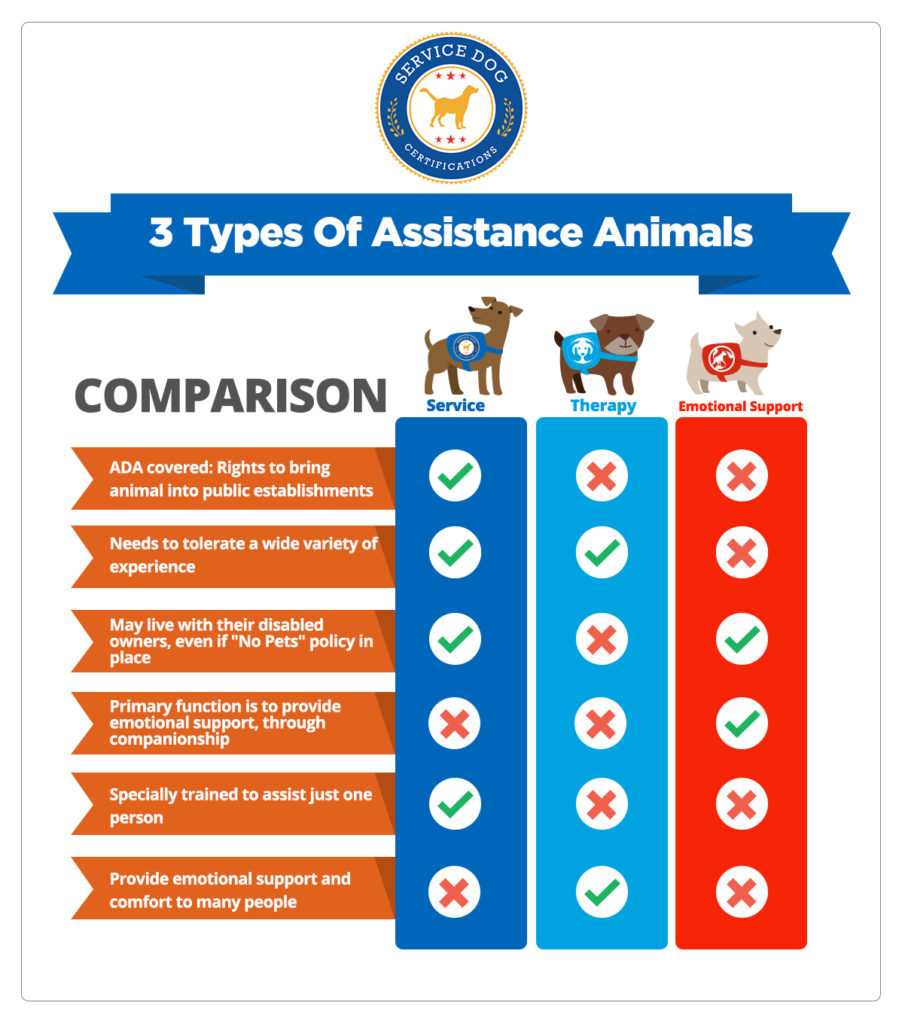Is an Emotional Support Animal the Same as a Service Dog?

No, an emotional support animal (ESA) is not a service dog because ESAs provide comfort just by being there, while service dogs are trained to perform tasks for a person with a qualifying disability. There are service dogs that help with mental health conditions, just like an ESA does, and they’re known as psychiatric service dogs. Service dogs can go anywhere the public is allowed – restaurants, stores, airplanes — while ESAs only have housing rights but no guaranteed public access rights, and can be refused entry under “no pets” policies. Service dogs are protected under the Americans with Disabilities Act, the Fair Housing Act, and the Air Carrier Access Act, while ESAs are only protected in housing under the Fair Housing Act.

Housing Rights
Housing rights are where service dogs and ESAs are the most similar. Service dogs can live in no-pets housing, and your landlord has to waive pet fees, deposits, and breed restrictions. Even if your lease says no pets are allowed, service dogs are the exception.
Emotional support animals have the same rights under the Fair Housing Act. To prove you have an emotional support animal, a landlord is allowed to ask you for an ESA letter.
Public Access Rights
The biggest difference between an ESA and a service dog is that a service dog can access almost all public areas closed off to pets, like restaurants, stores, hotels, museums, and theaters. Only two questions can be asked by staff:
- “Is this a service animal required because of a disability?”
- “What work or task has the dog been trained to perform?”
Emotional support animals, on the other hand, have zero public access rights. Businesses can legally refuse entry under “no pets” policies. Some individual businesses may allow them as a courtesy, but there’s no legal requirement.
Flight Rights
Service dogs are allowed to fly for free in the cabin with advance notice. The airline will ask you to complete the DOT Service Animal Air Transportation Form. Emotional support animals don’t have air travel rights, which means that:
- Pet fees apply (typically $100-200 each way)
- Size and breed restrictions apply
- Required carriers for cabin travel apply
- And some airlines don’t allow pets in the cabin at all
Documentation Requirements
If you want to turn your pet into an emotional support animal, you need a letter from a licensed mental health professional stating:
- You have a mental health condition that qualifies as a disability
- The animal provides emotional support that helps with your condition
- The letter must have the provider’s license information
- Letters are typically valid for one year
You’re technically not required to have a letter for a service dog. Still, many psychiatric service dog owners will get a PSD letter that states whether you have an ADA-eligible disability. This letter can be handy to have as backup in case your ADA eligibility is ever questioned.
About the Author: The writing team at Service Dog Certifications is made up of folks who really know their stuff when it comes to disability laws and assistance animals. Many of our writers and editors have service dogs themselves and share insights from their own experiences. All of us have a passion for disability rights and animals.
Related Articles

How to Qualify for An Emotional Support Animal
To qualify for an emotional support animal under the Fair Housing Act, you need to follow these three steps: The most important step is getting an ESA letter that meets HUD’s housing rules for emotional support animals. Make sure your ESA letter has the following: You should also ensure that your ESA letter is not […]

Read More

How to Get an Emotional Support Dog Letter
To make your dog your official emotional support animal, you need a signed ESA letter from a healthcare professional. That might sound like a lot of work at first, but getting an emotional support dog letter really just involves three easy steps: Let’s break down each of these steps so you know exactly what to […]

Read More

What to Do if Your Landlord Does Not Accept Your Emotional Support Animal
If your landlord has said no to your emotional support animal, there’s no need to panic; HUD’s rules are on your side. In this article we’ll let you know what you need to do and provide templates for you to smooth communications with your landlord. In this article: Keep in mind that most but not […]

Read More

My landlord is trying to evict me because I have a service dog which is 11 pounds which is my emotional support dog does she have the right to do that all of a sudden
It is illegal 😡 I am battling the same issues with my Service Dog